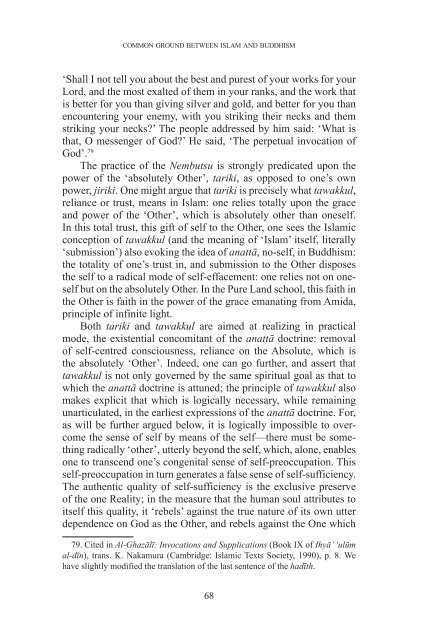Common Ground - Islam and Buddhism
Common Ground - Islam and Buddhism
Common Ground - Islam and Buddhism
Create successful ePaper yourself
Turn your PDF publications into a flip-book with our unique Google optimized e-Paper software.
c o m m o n g r o u n d between i s l a m a n d b u d d h i s m<br />
‘Shall I not tell you about the best <strong>and</strong> purest of your works for your<br />
Lord, <strong>and</strong> the most exalted of them in your ranks, <strong>and</strong> the work that<br />
is better for you than giving silver <strong>and</strong> gold, <strong>and</strong> better for you than<br />
encountering your enemy, with you striking their necks <strong>and</strong> them<br />
striking your necks?’ The people addressed by him said: ‘What is<br />
that, O messenger of God?’ He said, ‘The perpetual invocation of<br />
God’. 79<br />
The practice of the Nembutsu is strongly predicated upon the<br />
power of the ‘absolutely Other’, tariki, as opposed to one’s own<br />
power, jiriki. One might argue that tariki is precisely what tawakkul,<br />
reliance or trust, means in <strong>Islam</strong>: one relies totally upon the grace<br />
<strong>and</strong> power of the ‘Other’, which is absolutely other than oneself.<br />
In this total trust, this gift of self to the Other, one sees the <strong>Islam</strong>ic<br />
conception of tawakkul (<strong>and</strong> the meaning of ‘<strong>Islam</strong>’ itself, literally<br />
‘submission’) also evoking the idea of anattā, no-self, in <strong>Buddhism</strong>:<br />
the totality of one’s trust in, <strong>and</strong> submission to the Other disposes<br />
the self to a radical mode of self-effacement: one relies not on oneself<br />
but on the absolutely Other. In the Pure L<strong>and</strong> school, this faith in<br />
the Other is faith in the power of the grace emanating from Amida,<br />
principle of infinite light.<br />
Both tariki <strong>and</strong> tawakkul are aimed at realizing in practical<br />
mode, the existential concomitant of the anattā doctrine: removal<br />
of self-centred consciousness, reliance on the Absolute, which is<br />
the absolutely ‘Other’. Indeed, one can go further, <strong>and</strong> assert that<br />
tawakkul is not only governed by the same spiritual goal as that to<br />
which the anattā doctrine is attuned; the principle of tawakkul also<br />
makes explicit that which is logically necessary, while remaining<br />
unarticulated, in the earliest expressions of the anattā doctrine. For,<br />
as will be further argued below, it is logically impossible to overcome<br />
the sense of self by means of the self—there must be something<br />
radically ‘other’, utterly beyond the self, which, alone, enables<br />
one to transcend one’s congenital sense of self-preoccupation. This<br />
self-preoccupation in turn generates a false sense of self-sufficiency.<br />
The authentic quality of self-sufficiency is the exclusive preserve<br />
of the one Reality; in the measure that the human soul attributes to<br />
itself this quality, it ‘rebels’ against the true nature of its own utter<br />
dependence on God as the Other, <strong>and</strong> rebels against the One which<br />
79. Cited in Al-Ghazālī: Invocations <strong>and</strong> Supplications (Book IX of Ihyā’ ‘ulūm<br />
al-dīn), trans. K. Nakamura (Cambridge: <strong>Islam</strong>ic Texts Society, 1990), p. 8. We<br />
have slightly modified the translation of the last sentence of the hadīth.<br />
68


